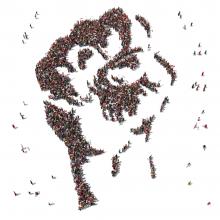ordinary

When stories of human trafficking or dramatic rescue operations come across our news feeds, we are understandably shocked. For a moment, our attention is grabbed and we feel genuine outrage toward the traffickers and, hopefully, compassion for the trafficked persons. But to what end?
Sadly, the underground and criminal nature of human trafficking helps to keep the stark realities out of sight and, consequently, out of the minds of most people. When we do think of human trafficking, it tends to be as something that happens “over there” or in seedy brothels. It is somehow easier to blame the bad actors, pimps, traffickers, and sweatshop managers rather than recognize the multiple ways that we are connected to human trafficking through our everyday actions. Because we are, in fact, connected. As Pope Francis observed in his apostolic exhortation, Evangelii Gaudium: “There is greater complicity than we think. The issue [modern slavery] involves everyone!”
Human trafficking is present in virtually every human community. Moreover, because the majority of people held in slavery today are forced to work in agriculture and mining, it is inevitable that products make it into the supply chain and our shopping carts. Sex trafficking also does not happen in a vacuum, but rather in a social context which tolerates, and even normalizes, sexual exploiation and the commodification of the human person.

I am co-owner of an online boutique store that empowers survivors of trafficking with employment.
I am a social entrepreneur.
I am an abolitionist.
I am…uncomfortable with these kinds of labels.
Because at the end of the day, I’m very ordinary, and these descriptors seem to imply that I’m not.
I live an ordinary life. I wake at the crack of dawn to drive my kids to school and then return home to work, trying to get most of my business done during the hours that my children are at school. Snow days and random holidays are the bane of my work life, and the words, “Sorry, hon, I’m working right now. Give me a minute?” come out of my mouth more than I’d like. I spend the lion’s share of my days on my laptop, troubleshooting, responding to emails, thinking about future lines of clothing, and making sure that the expenses won’t be more than that month’s income. Sometimes, in the midst of the daily humdrum of life, I forget that what I’m doing really does make a difference, half a world away, in the lives of survivors of trafficking.

THE CHILDHOOD UNDERSTANDING of the familiar tune about climbing Jacob’s ladder needs a reset. The Genesis narratives aren’t just about heaven—they yield epiphanies into the ordinary life of faith. The household of Abraham and Sarah, even in its ancient context, is atypical. In family dynamics, without the miraculous moments, epiphanies subvert our expectations of whom and what God can utilize to reveal the faithfulness of divine promises. Sometimes the testimony is evident in ordinary lives—even ours. You’ve heard it said, “Our greatest weakness is our strength.” The episodes in Jacob’s life provide sufficient demonstrations of how passions both energize and blind us: Passion or anger; leadership or arrogance; emotion or intuition; determination or stubbornness.
Despite Jacob’s inconsistencies, the second half of Genesis encompasses his story, as the son of Isaac, grandson of Abraham. Here we find an unfolding drama. Characters display human nature at its extremes: conniving relatives, loving couples; creative entrepreneurs, dishonest contractors. All, somehow, used by God to form a people with whom the Spirit so evidently abides.
Even when we go our own way, God’s purposes are not thwarted. The challenge for the church in this Pentecost season is to trust that God is planting seeds in good soil—and the seeds that won’t sprout also have a purpose in this garden. Remember that the actions of justice, grace, and faithfulness we practice at home are as much a witness to God as our public proclamations and protests.

I MEET Yehoshua November in an empty classroom in Touro College in Brooklyn, N.Y., where he teaches. The chairs and desks are piled to one side, like a barricade. We sit in a clearing beside the clutter, talking about his place as the only Hasidic poet—he is a 34-year-old member of the Lubavitch sect—on the American literary landscape, an entity ruled largely by secular academics far removed from the realities and sensibilities of ultra-orthodox Jewish observance and mysticism.
“They are the rabbis of poetry,” November laughs. He laughs so hard he doubles over in his chair. His laughter is as strange as it is infectious. Yet in all of God’s Optimism, his book that was short-listed for the 2010 LA Times Book Prize, there is not a single laugh line. His poems are serious, if lightly held narratives, some parable-like, most down to earth with a longing for heaven.
“Poetry is their vision of spirituality, their own religion, and they don’t want traditional religion brought in,” he says.
Even November’s long, reddish beard seems delighted at their rebellion against traditional religion. An antinomian Hasid and unashamed of it.
When I first read God’s Optimism, the poem I kept going back to was “Baal Teshuvas at the Mikvah” (baal teshuvas are secular Jews who return to religious observance), a poem of solidarity with those intimate others who came to Hasidism through the tunnel of the profane, commonly marked by drug use and sexual looseness, for the sake of spiritual passion held within a net of restrictions.

A PROFOUND SENSE of expectation launches a new year. As the season of Advent commences the Christian year, just weeks before the turn of the calendar year, familiar biblical stories invite us to begin again by glimpsing the coming reign of God. Weekly worshippers and annual attendees gather for the season premiere of the greatest story ever told. A promise. A vision. A hope. Great expectation.
The ancient prophet, psalm, gospel, and epistle together extend to the contemporary preacher words of unflinching hope that emerge fresh from the rubble of turmoil, trial, and tribulation of every God-seeking generation. Today’s words of hope must also descend like the savory aroma of a holiday meal, promising solace to the harmed, heartbroken, and hindered.
Familiarity with the Advent and Christmas narratives may leave us unaware of the radical expectation and potential impact that reciting these events can bring. These readings offer an arresting narrative of divine presence inaugurating an unprecedented commonwealth from among the divided nation. The vision makes no sense if it does not offer an alternative to the existing promises of “life, liberty, and the pursuit of happiness.” The narrative challenges us to understand that our celebration of the birth of Jesus is not shiny lights or a musical presentation. It anticipates the arrival of goodness signaling an end to corruption and gloom. This global holiday extends the drama narrated in Christian scripture as each generation must wrestle again with the contemporary relevance of the birth of Jesus.